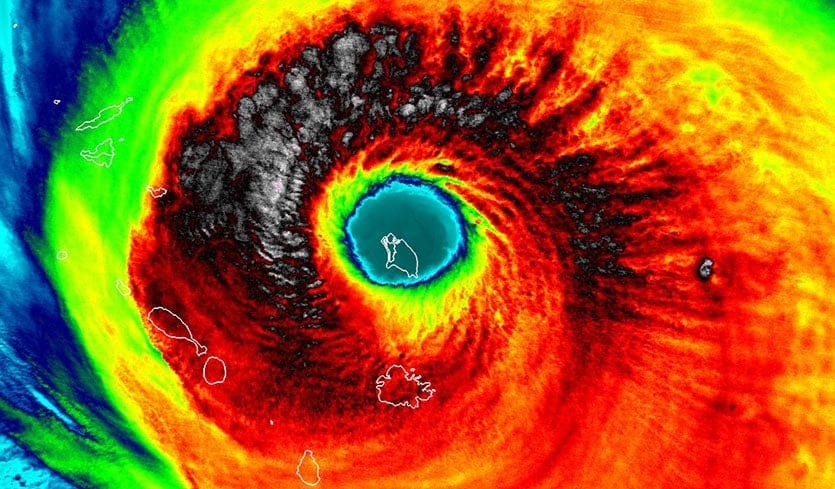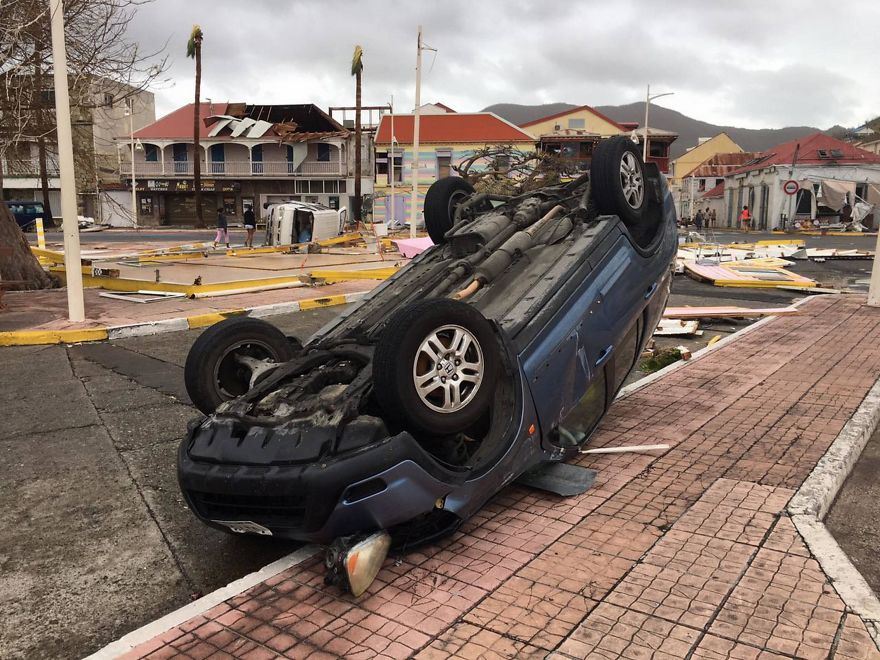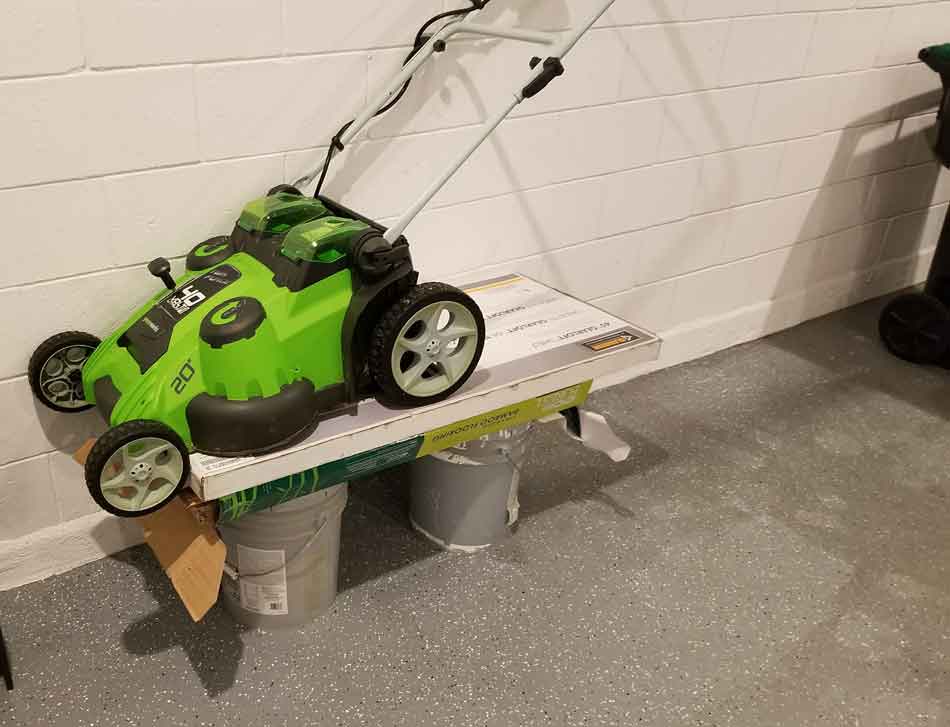When Hurricane Irma was bearing down on my new house, the scariest part was when they announced the tornado warning. The walls in my garage are concrete, so I thought that would be the safest place in the house.
Boy, was I wrong.
Garages are not a safe place to shelter during a hurricane or tornado. When used correctly, hurricane-rated garage doors offer substantial protection. However, it’s still not enough to withstand the wind speeds of intense hurricanes or tornadoes.
Even though you should never use your garage to ride out a hurricane or tornado, there are things you can do to make it safer.
We’ll get into those a bit later. First, let’s explain why your garage isn’t safe in a hurricane or tornado.

Is The Garage Safe in a Hurricane or Tornado?
If you’re wondering if your garage is safe to ride out a hurricane or tornado, let’s answer that immediately.
No. Your garage isn’t a safe place to shelter during an extreme storm like a tornado or hurricane.
Here are a couple of reasons why:
Not every garage door is wind-rated: In fact, most ARE NOT!
If you live in one of the southern states most affected by hurricanes, chances are pretty good you’ve got a wind-rated garage door on your house. However, outside of coastal states, it’s rare to find
If your garage door isn’t wind-rated, they’re almost always made of thin material that cannot withstand hurricane-force winds.
It’s common to see hurricane-force winds pick up trees, signs, power lines, or debris and fling them through garage doors during the storm.
Garage doors aren’t very secure: Garage doors cover a large area and are only secured to the house at a few points. If they are damaged or, worse, ripped off, anyone inside is at the mercy of the storm.
Garage doors are not waterproof: Keeping water out of your garage is hard. Flash flooding is expected in extreme storms and can cause parts of your garage to become submerged. If you live near rivers or lakes, the storm surge could cause a person to become trapped inside.
Everything can become projectiles:
Remember that barn scene in Twister? Garages are full of items that would be very dangerous if they fell over, collapsed, or went airborne during high winds.
While your garage has its role during a tornado or hurricane, it is not safe to take shelter and ride out the storm.

How to Make a Garage Safer in a Hurricane or Tornado
There’s some prep work to do in the garage before the storm hits.
Here are some simple steps you can take:
- Get it off the ground. I moved anything I could off the ground before Hurricane Irma hit to avoid water damage. For example, I stacked my lawnmower on two paint buckets and some extra wood flooring panels. There are better ways to store your lawn mower in your garage, but you need to get creative and use what you’ve got.
- Bolt all shelving securely to the wall. Collapsing shelves are dangerous during a natural disaster like a hurricane, tornado, or earthquake. Avoid this by securing your garage’s shelves and workspace storage to the wall with brackets.
- Reinforce your garage door. For extra protection, secure your garage door with a hurricane brace. It’ll be less likely to get damaged from hurricane-force wind and impacts.
- Install a generator. Thousands of generators are sold in the days leading up to a hurricane. It’s a great backup if you lose power for days or even weeks following a massive hurricane.
- If a hurricane is imminent, park your car in the garage and keep it stocked with emergency supplies such as extra fuel.
- Make sure your garage is up to code. Even though this isn’t a last-minute prep, this is critical in older homes. A structural engineer should occasionally inspect walls, support beams, and other structural elements. This helps ensure that there aren’t any structural weaknesses that could fail in a hurricane or tornado.
Where to Put Your Car During a Hurricane
We’ve all seen videos of tornadoes and hurricanes picking up cars off the dry pavement.
Leaving your car outside in a hurricane could turn it into a projectile aimed at someone’s house.
The best place for your car is inside your garage during a hurricane or tornado. That means you’ll need to declutter your garage to free up space.
This keeps your car protected and also keeps it from becoming a projectile. If you leave your car outside, it’s susceptible to damage from flying debris or flash flooding.
You’ll want to fill your tank up before you park your car. If the hurricane hits harder than expected, or you need to make a quick exit, it’s good to have a full gas tank.
We’ve all seen the pictures of highways with bumper-to-bumper traffic from people evacuating. It’s better to leave early rather than too late.
You should also keep some basic hurricane supplies in your car if you need to evacuate. Don’t go overboard here. Add bottled water, dry food, and a small overnight bag.
It’s essential to be prepared before the emergency really hits.

Store Outdoor Items in the Garage During a Hurricane
This goes without saying, but you want to ensure that anything outdoors the wind could pick up is safely stored inside.
Hurricane-force winds turn every piece of debris into a potentially lethal projectile. This includes innocuous things like lawn decorations and furniture.
Before the storm hits, store these popular yard items inside for safekeeping:
- Patio and lawn furniture
- Bird feeders
- Wind chimes
- Hanging and potted plants
- Children’s toys
- Dog houses
- Lawn equipment
- Swing sets
- Garden art/statues
- Barbecue grills
Try to look at everything in your yard as potential projectiles if they were picked up by hurricane-force winds.
Storing these things in the garage is vital for keeping your garage (and home) safe during a hurricane.
Store Your Hurricane Supplies Indoors
When stocking up rations, water, and potential emergency supplies for a hurricane, storing them in the garage is not a good idea. It’s better to keep them in your house’s pantry or other climate-controlled areas.
There are several reasons why it’s better not to keep emergency supplies in the garage if you can help it.
Supplies like rations and water could be damaged or blocked by debris. This can make post-hurricane recovery more complex.
- Temperature and humidity fluctuations: Unless you have a temperature-controlled garage, the changes in temperature and humidity in garage storage are a terrible combination with long-term food storage.
- Potentially blocked off by storm debris: Your garage door is extremely vulnerable in a hurricane or tornado. Debris may block access to vital supplies needed in the hurricane’s aftermath.
- Insect and pest exposure: Let’s face it, it’s hard enough to keep pests and insects out of your garage. It gets more complicated when your house is damaged during a hurricane or tornado. If you don’t store your supplies in a secure container, you’re likely any spiders living in your garage make them their new home.
Where to Take Shelter Instead of a Garage
Garages are typically not the safest places to take shelter during extreme weather events like hurricanes or tornadoes.
This is due to their large doors, windows, and relatively weak structures. If a tornado or hurricane is imminent, it’s vital to get to a safer place immediately.
Here are some safer alternatives:
Basement or an Interior Room
The first and most accessible option for many homeowners is their basement or an interior room on the lowest floor of the house.
This could be a small, windowless room like a closet, bathroom, or hallway.
The aim is to put as many walls between you and the outside as possible.
This significantly reduces the risk of being hit by flying debris. Always avoid windows, doors, and outside walls, as these could shatter or collapse during a severe storm.
Storm Shelter or Safe Room
If your house has a storm shelter or a safe room, that’s even better.
These rooms are designed to withstand extreme weather events’ destructive forces. They are anchored to the ground to resist being lifted during a tornado. They are reinforced with concrete and steel to withstand high winds and flying debris.
A storm or tornado shelter can be installed in a basement, garage, or outdoors.
A safe room can be incorporated into the construction of a new home or retrofitted into an existing home.
Parking Garage
A multi-level parking garage might be your safest bet if you’re caught outside or in a car during a storm and can’t make it home. These structures are typically made of concrete and have solid exterior walls and a strong roof.
Try to park as far away from the outside as possible, ideally on the lowest level and near an interior wall or column.
However, remember that this is a last resort. A properly constructed storm shelter or safe room is the safest place during severe weather.
Hurricane & Tornado Preparation Guidelines
When taking shelter during a hurricane or tornado, it’s crucial to have a well-thought-out plan and necessary supplies. Also, have a backup plan if the situation changes.
Here are some guidelines to follow when taking shelter:
1. Prepare an Emergency Kit
Your emergency kit should include essentials such as enough water and non-perishable food for each person for at least three days, necessary medications, a flashlight, a battery-powered radio (to stay up with updates), extra batteries, personal documents, and a first aid kit.
It’s also wise to have a sturdy pair of shoes for each family member if you need to walk across broken glass or debris.
2. Have an Evacuation Plan
Make a plan of where to go and how to get there if a hurricane or tornado is imminent and you must evacuate.
This plan should include multiple routes if the primary road is blocked or dangerous. Practicing the evacuation plan with everyone in your household is also a good idea to ensure everyone knows what to do and where to go.
3. Stay Away from Windows and Doors
Regardless of where you are taking shelter, staying away from windows and doors is essential. They can shatter or break under intense winds, leading to flying debris. As an additional protective measure, consider covering yourself with blankets, pillows, or mattresses for added protection.
4. Sheltering in a Car
Stay in your car if you are caught in a parking garage during a storm and have no safer option. Keep your seatbelt fastened and put your head down the windows, covering it with a blanket if possible. Remember, this is a last resort. It’s always best to make your way to a permanent building designed to withstand a storm if there is time.
In all cases, stay tuned to local news, weather forecasts, and emergency updates, and follow the instructions of local authorities.
FAQ
Is a garage safe from a tornado? No, garages are generally not considered safe during a tornado. Garage doors are not safe during the high wind speeds of a tropical storm. Additionally, the overall structure may not be as robust as other parts of a home.
Is a detached garage safe during a tornado? A detached garage is not safe during a tornado. It is not designed to withstand high winds and flying debris and may collapse or be damaged during a storm.
Where is the safest place to be in a tornado? The safest place during a tornado is in a storm shelter or basement. If those are not available, go to a small, windowless room on the lowest level of your home, like a closet or bathroom.
Is a laundry room next to a garage safe during a tornado? It depends on the structure of the room and the home. It may be a safe place if the laundry room is in the house’s interior and has no windows. But if your laundry room is adjacent to the garage with a shared wall, it may be unsafe due to the garage’s risk of being damaged or collapsing.
What to do with the garage for a hurricane? Secure the garage door with a brace or reinforcements to withstand high winds. Remove or secure any loose items in the garage that could become projectiles. Consider installing flood barriers if your garage is prone to flooding.
Should you lock the garage during a hurricane? Yes, locking your garage door can help maintain the door’s structural integrity, reducing the risk of it being blown in or damaged during a hurricane.
How do I prepare my garage for a hurricane?
- Secure the garage door with braces or reinforcements
- Remove or secure loose items
- Install flood barriers if needed
- Check your garage door’s balance and alignment
- Make sure your garage door opener has a battery backup in case of power outages.
Can strong winds open a garage door? Yes. Strong winds can open a garage door, especially if it’s not well-maintained or adequately secured. That’s why it’s essential to reinforce and lock your garage door during a hurricane or any other severe storm.
Wrapping It Up
The warnings come every time a big storm approaches, so you need to be prepared. A little work ahead of time can go a long way to keeping your home, garage, and loved ones safe during a hurricane.
Remember, your garage isn’t a safe place to shelter from the storm.
